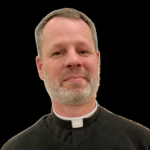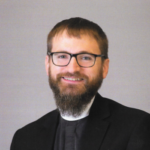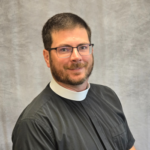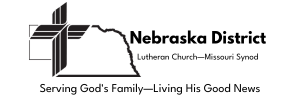 Rev. Scott Adle, Zion, Imperial
Rev. Scott Adle, Zion, Imperial
Question #1: What, in your opinion, are the most pressing mission issues facing the Nebraska District today? How would you, as district president, address them?
“The harvest is plentiful, but the workers are few.” One of the more pressing issues facing districts with many rural parishes is twofold: 1) smaller congregation size, combined with 2) fewer number of pastors available. We are having more instances of churches being vacant for longer periods of time. Part of the problem is the paucity of pastors, but another is congregations not being able to pay a living wage.
I would try and address this a couple of ways. 1) Congregations will have to work together in dual parish, tri-point parish, or some other arrangement so that they can pay a living wage. 2) Some parishes where the pay may be fine, but the work is not full-time work, should be encouraged to help out fellow congregations. 3) I honestly think the pay scale needs to increase, so that we can attract men to serve in these situations.
Question #2: As a District, we struggle at times to be reconciled and to walk together in unity. What specific things would you seek to do to create unity in Christ and to foster reconciliation with our communities, lay people, pastors, and district leaders?
“Follow the sound pattern of words that you have heard.” Any church must gather around her Lord, Jesus Christ. For hundreds of years, our unity has been based around our common confession of that Lord. Part of that was a common practice on Sunday mornings. We said the same words, we sang the same hymns, we taught our kids the same way.
Our Synod Constitution, Article VI, item 4, which specifically talks about “Conditions of Membership” to Synod, says that congregations will make “exclusive use of doctrinally pure agenda, hymnbooks, and catechisms in church and school.”
This is how we agreed to “walk together” as a Synod for over a hundred years. I’m not sure that is true today. Synodically-approved hymnals and agendas are not being used exclusively by many churches. Instead, it seems more like, “every church for itself.” I would work diligently towards getting us all on the same page.
 Rev. Andrew Gerike, Mount Calvary, Omaha
Rev. Andrew Gerike, Mount Calvary, Omaha
Question #1: What, in your opinion, are the most pressing mission issues facing the Nebraska District today? How would you, as district president, address them?
The most pressing mission issue is for our congregations to have the courage to be the Church of God in their place. The congregations of our District are in many and varied situations (rural, urban, suburban, large, small, stable, growing, shrinking). The chief thing for God’s people gathered as the Church, wherever that might be, is to simply be who they are: the baptized people of God. We are those whom God has called out of darkness into His marvelous light. We are a beachhead of the kingdom of heaven on earth. Bureaucracy and humanly devised programs and objectives will not accomplish the Church living out this mission. The Christian life of repentance, of faith strengthened by the Means of Grace, and of holy living in Church, family, and out in the world, that is what Christians do, and what I would encourage our pastors, congregations, and all our people in.
Question #2: As a District, we struggle at times to be reconciled and to walk together in unity. What specific things would you seek to do to create unity in Christ and to foster reconciliation with our communities, lay people, pastors, and district leaders?
Unity cannot be created or forced by any man, but can only be created by the Word of God. The common confession that our congregations and that we as a District and Synod are pledged to is the Book of Concord. The significance of this cannot simply be given lip service or reduced to a token assertion. Whatever the area of struggle, the brethren need to come together to discuss the matter openly and honestly. The Scripture passages and relevant sections of the Book of Concord need to be set forth as the judges and arbiters of the truth. We then need to ask, “Do we understand these passages the same way? Why or why not? Is our public confession what shapes and informs our doctrine and practice, or something else?” Our public confession of God’s Word, the Lutheran symbols, needs to be the ever-central norm of our life together.
 Rev. Adam Moline, Good Shepherd, Lincoln
Rev. Adam Moline, Good Shepherd, Lincoln
Question #1: What, in your opinion, are the most pressing mission issues facing the Nebraska District today? How would you, as district president, address them?
The most pressing mission issues facing the Nebraska District today are the erosion of Lutheran distinctives, the decline of biblical literacy, and growing secularism in Nebraska. The Church is pressured to give in to cultural trends, usually at the expense of Scriptural authority and Lutheran identity. Additionally, our rural congregations struggle with pastoral vacancies and limited resources.
As district president, my primary focus would be to uphold the pure doctrine of the Gospel as confessed in the Lutheran Confessions. I would ensure that our pastors are equipped with the tools to faithfully preach and teach God’s Word and administer the Sacraments, while adhering to the Lutheran Confessions. I would also encourage the support and revitalization of rural congregations through discussion leading to new parish boundaries and pastoral coverage. Lastly, I would encourage better preaching and teaching through solid pastors’ conferences, presidential and circuit visitation, and preaching workshops.
Question #2: As a District, we struggle at times to be reconciled and to walk together in unity. What specific things would you seek to do to create unity in Christ and to foster reconciliation with our communities, lay people, pastors, and district leaders?
As Lutherans, we confess that true unity in Christ is founded upon the pure preaching of the Gospel and the right administration of the Sacraments. To foster reconciliation and unity, I would focus on these truths, ensuring that all leaders and members of the Nebraska District are founded upon the sound doctrine of Scripture.
As district president, I would encourage genuine dialogue and study among pastors and lay people, prioritizing doctrinal clarity while maintaining mutual respect. I believe regular visitation by the president and circuit visitors is important to help resolve misunderstandings and disagreement.
Additionally, I would address divisions by promoting an environment of self-examination and repentance amongst all our pastors, where the goal is not personal agendas, but the glory of God through faithful ministry. Through mutual confession and absolution we would work toward a true and lasting unity in Christ.
 Rev. Richard Snow, President, Nebraska District
Rev. Richard Snow, President, Nebraska District
Question #1: What, in your opinion, are the most pressing mission issues facing the Nebraska District today? How would you, as district president, address them?
Our mission is to be who we are: the Body of Christ reaching out to His creation broken in sin. I see three primary mission issues in our district. First, we need to be steadfast in the Word. It’s hard to nurture others if you’re not being fed yourself. Second, we need families gathered around that Word, marriages strengthened, and parents and grandparents living out their vocations as the primary faith-shapers of those entrusted to them. Third, like Jesus, we need eyes and ears open to see community needs and opportunities where we can serve and then we live out the love of Christ. All of this can only happen if we are immersed in the Word and actively using our gifts to serve others; therefore, the focus must be supporting the local congregation to strengthen adults in Bible study, family ministry, and vocational witness. I am using conferences, conventions, trainings, and gatherings to equip and encourage pastors and congregation leaders as they lead and influence congregations. It is the local Body of Christ, the family of faith, that builds connections, cares for the hurting, reaches out to the lost, and shines forth the truth.
Question #2: As a District, we struggle at times to be reconciled and to walk together in unity. What specific things would you seek to do to create unity in Christ and to foster reconciliation with our communities, lay people, pastors, and district leaders?
Our unity is found in Christ. It is His gift given as He draws us to Himself in faith. Displaying that unity is our challenge and begins as we gather around His Word. Without the Word we too often mirror our fractured society, labeling and discarding those who disagree with us. We need to commit to one another in gathering around God’s uniting Word. Under the guidance of His Word, He leads us to be reconciled to one another. I constantly and consistently direct people to go and talk to those with whom we are in conflict. In Matthew 5, Jesus tells us to leave the gift before the altar and be reconciled. Similarly, in Matthew 18, He tells us to go to the one who has offended us. In my circuit presentations I discuss topics of controversy. The Synod’s Koinonia process works to establish common ground and areas needing focus. Reconcilers, circuit visitors, vice-presidents, and District staff are engaged to help restore unity in the local context. And daily we pray, “Forgive us our trespasses as we forgive those who sin against us.”
“Candidates for the office of District President shall be at least the five (5) ordained ministers who receive the greatest number of nominations and agree to serve if elected.” (2022 District Bylaws, III.C.2.a)(2))
Declined: Rev. Luke Biggs, Peace, Grand Island; Rev. Scott Bruick, St. John, Seward; Rev. Micah Gaunt, Peace, Hastings; Rev. Philip Hale, Zion, Omaha; Rev. Lonnie Jacobsen, Nebraska District LCMS, Seward; Rev. Ryan Janke, St. Peter/St. Paul, Orchard/Venus; Rev. Robert Kuefner, Trinity, Lexington; Rev. Brent Kuhlman, Trinity, Murdock; Rev. Mark Middendorf, Zion, Scotia; Rev. James Moshier, Trinity, Arapahoe; Rev. Craig Niemeier, Zion, St. Libory; Rev. Scott Porath, Immanuel, Eagle; Rev. John Rasmussen, Holy Cross, Kearney
